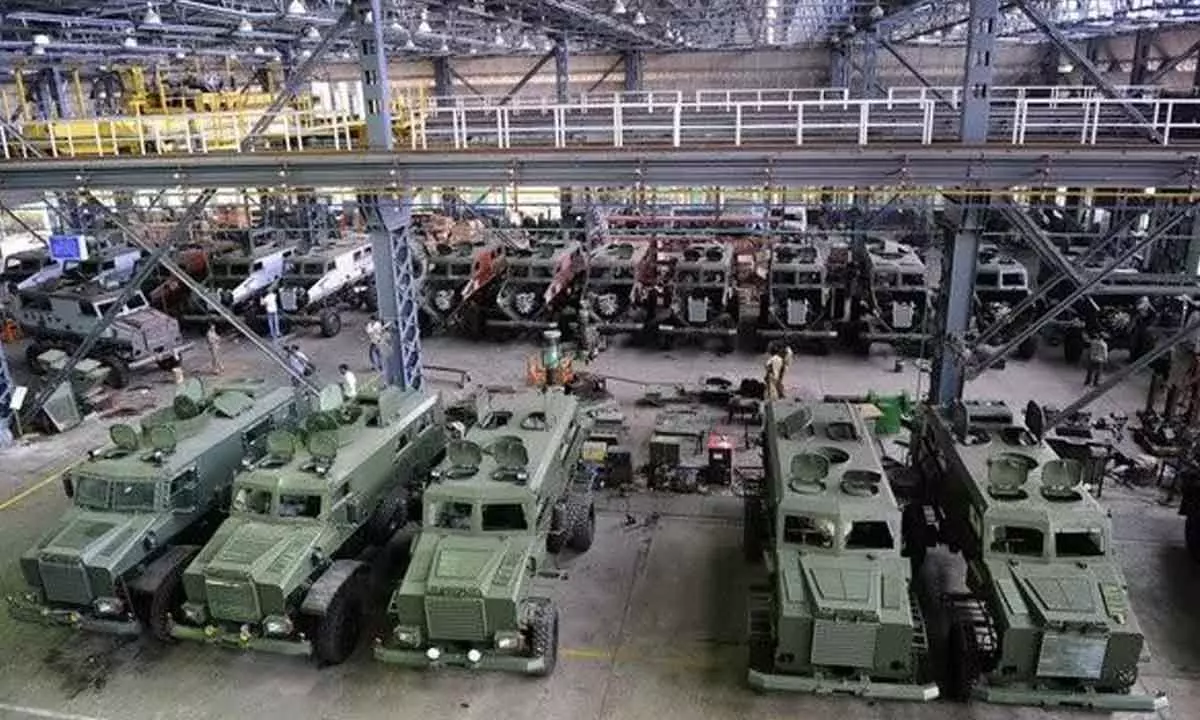Private entities propelling India’s defence production to new heights
The private sector contributes 22 per cent of total defence production
image for illustrative purpose

The Union government has announced an ambitious plan for the fiscal year 2024-25, which includes a target to increase the country's defence exports to $ five billion from the current $1.5 billion. The government also aims to significantly raise the total annual defence production to Rs. three lakh crore by 2028-29
The 'Make in India' initiative, spearheaded by the Narendra Modi government, has seen a significant boost in the defence sector. Aimed at promoting domestic defence manufacturing and fostering greater participation of private enterprises, the initiative has yielded promising results. In the fiscal year 2023-24 (FY24), private sector entities in India have played a pivotal role in strengthening the nation's defence production. Their substantial contribution of Rs. 16,411 crore, which accounts for 22% of the total defence production valued at Rs. 74,739 crore for FY24, is a testament to their growing influence in this sector.
This represents the largest share of private sector involvement since the fiscal year 2016-17. Although private sector defence production in FY24 decreased from the previous fiscal year's Rs. 21,083 crore, constituting 19% of the total, it retained a larger share due to a comparatively milder decline in overall figures. This resilience amid challenges is noteworthy. The total defence production in India for FY24 amounted to Rs. 74,739 crore.
Push for local defence production:
The Ministry of Defence has set ambitious targets for defence production in the current financial year. The aim is to reach a new record high, targeting Rs. 1.5 lakh crore, with a potential to go up to Rs. 1.75 lakh crore. This follows a significant milestone in the previous financial year when the nation's defence production soared to Rs. one lakh crore.
In a further show of commitment, the Defence Minister announced a plan to allocate Rs. one trillion, equivalent to 75% of the defence acquisition budget, to local companies. This, along with the defence offset policy that mandates foreign companies to invest in or purchase from domestic firms, is expected to boost the local industry.
According to government estimates, nearly 45% of new defence orders will be awarded to the private sector. Private industries and micro, small, and medium enterprises (MSMEs) produce a significant portion of subsystems, components, and spares crucial to the supply chain network. As such, orders placed with public sector undertakings (PSUs) indirectly benefit the private sector.
Defence exports surged to a historic high of Rs. 21,083 crore in 2023-24, marking a remarkable 32.5% increase compared to the previous fiscal year. The private sector has contributed approximately 60% of the total exports, with DPSUs accounting for 40% of it.
The Union government has announced an ambitious plan for the fiscal year 2024-25, which includes a target to increase the country's defence exports to $ five billion from the current $1.5 billion. The government also aims to significantly raise the total annual defence production to Rs. three lakh crore by 2028-29, which is almost three times the current level. In order to fulfill the export orders recently obtained by Indian companies, the target for defence exports has been set at Rs. 50,000 crore, which is more than double the current figure of Rs. 21,083 crore.
Moreover, India is trying hard to increase its defence exports, including selling its domestically built light-combat aircraft (LACA) Tejas, manufactured by Hindustan Aeronautics Limited (HAL), with private partners. Although India is yet to find any buyers for Tejas, the potential sale of these aircraft could significantly enhance exports and place India in an exclusive club of fighter jet exporters.
Recently, India delivered HAL-228 aircraft to Guyana's defence forces, indicating its commitment to expanding defence exports and cultivating stronger relationships with countries worldwide. The government has also expressed interest in exporting fighter jet engines in the future, citing an engine manufacturing agreement between GE Aerospace and HAL for the GE 414 engine that will power future Tejas variants.
Investments in the defence sector are not limited to the government, as the private sector is also actively investing in new production facilities. The Uttar Pradesh and Tamil Nadu defence corridors have received significant amounts of investment, with the former receiving Rs. 25,397 crore in investment announcements. This includes small arms manufacturing in Kanpur and a new facility for electro-optics at Noida. The Tamil Nadu defence corridor has also seen investments worth Rs. 11,821 crore.
The government's initiative to establish defence industrial corridors in Uttar Pradesh and Tamil Nadu aims to promote local production, reduce reliance on imports, create opportunities for domestic manufacturers, and boost the export of indigenous equipment. These corridors hold the potential not only to fortify national security but also to bolster the economy by reducing dependence on imports and generating employment opportunities.
Despite the optimistic outlook, the defence industry in India is fraught with challenges such as the possibility of outdated technology and limited management resources.
The sector is largely dependent on bureaucratic wrangling, defence PSUs, and DRDO - all of whom tend to make grand promises but often fail to deliver. On top of that, the armed forces' qualitative requirements are often manipulated in a manner that favours foreign vendors while hindering domestic manufacturers, thus exacerbating the already chaotic situation.
The success of the 'Make in India' initiative, particularly in defence start-ups, largely depends on the government's support for manufacture of the desired platforms and encouraging armed forces to procure them.
Devoid of this support, the private defence manufacturing sector may not thrive, as it may not receive the necessary patronage from its own armed forces. The government should, therefore, emphasise to the military-defence bureaucracy that private defence manufacturing needs to be supported, in addition to DPSUs and DRDO, in order to achieve the intended outcomes.
(Ravi Shankar is a journalist who writes on defence, strategic affairs and technology)

